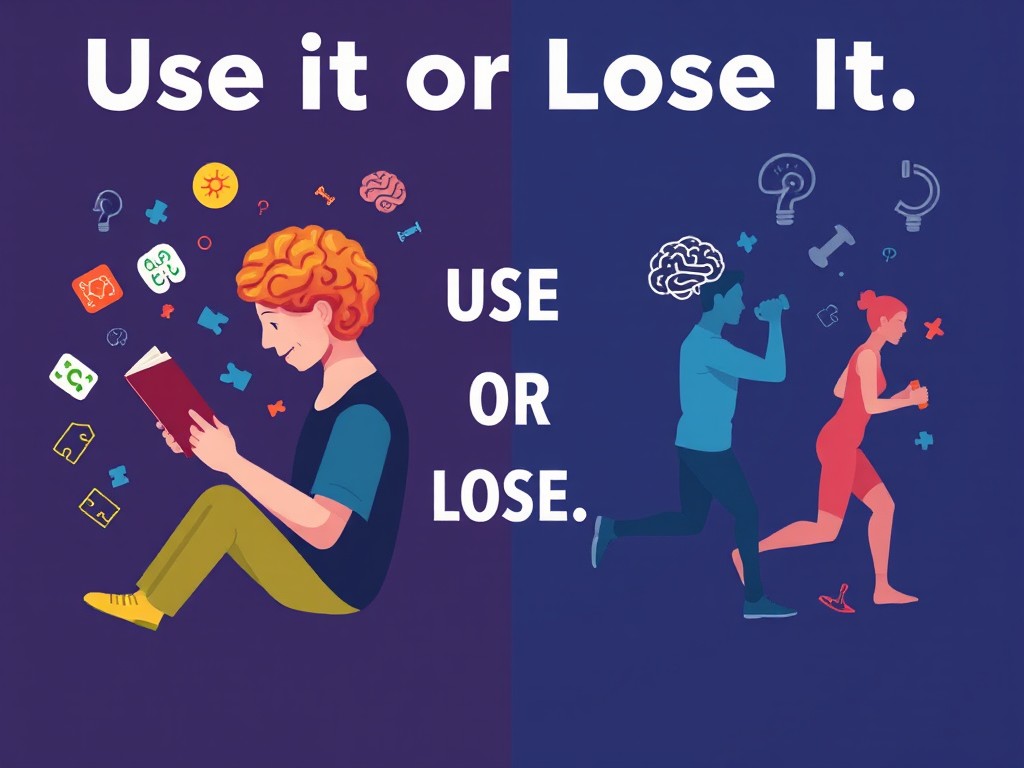Use It or Lose It: How to Keep Your Skills Sharp and Relevant
In a fast-paced world where knowledge, skills, and abilities can quickly become outdated, the concept of “use it or lose it” has never been more relevant. Whether it applies to physical fitness, cognitive abilities, or professional skills, this principle emphasizes the importance of regular practice and engagement. In essence, when you stop using a skill or ability, it deteriorates over time. But how does this really happen, and what can you do to prevent it? This article will explore the science behind the “use it or lose it” phenomenon and provide actionable strategies to help you stay sharp and relevant in all aspects of life.
Understanding the “Use It or Lose It” Concept
The phrase “use it or lose it” is often applied to various areas of life, from physical fitness to intellectual engagement. At its core, it suggests that without regular practice or engagement, abilities, whether physical or cognitive, can decline. This idea is supported by numerous studies across different fields. For example, when it comes to brain function, neuroscientists have found that neural pathways strengthen through repeated use but weaken when neglected.
On the physical side, athletes and fitness enthusiasts know all too well how quickly muscle strength and endurance fade when regular training is stopped. Similarly, if you learn a new language but stop practicing it, you might find that vocabulary and grammar rules fade from memory. Essentially, the brain and body thrive on challenges and practice—when they don’t get these, they become less efficient.
In our modern world, where skills evolve rapidly due to technological advances and shifting work environments, staying relevant means consistently refining and applying your knowledge. The “use it or lose it” concept isn’t just a casual phrase—it’s a scientific reality that affects both mental and physical well-being.
The Science Behind “Use It or Lose It” in the Brain
The brain operates much like a muscle. The more you use certain areas of your brain, the stronger and more efficient those neural pathways become. This idea is rooted in a concept known as neuroplasticity, which refers to the brain’s ability to reorganize itself by forming new neural connections throughout life. When you practice a skill, like playing the piano or solving math problems, the neurons responsible for those tasks become more efficient and communicate faster.
Conversely, when you stop engaging in a specific activity, the neural pathways associated with that task weaken over time. This is why someone who hasn’t played a musical instrument for years might struggle to remember the notes or techniques they once mastered. The brain’s ability to retain skills is dependent on continuous engagement and repetition. Essentially, neurons that “fire together, wire together,” meaning the more you use a particular network of neurons, the stronger the connections become. Without use, those connections fade.
This principle applies to a wide range of cognitive activities. For example, learning a new language strengthens specific areas of the brain associated with memory, problem-solving, and verbal communication. However, if you stop practicing the language, you’ll notice a gradual loss in fluency as those pathways weaken.
The Impact of “Use It or Lose It” on Physical Fitness
The physical effects of “use it or lose it” are equally profound. When it comes to fitness, your muscles, cardiovascular system, and flexibility all require regular use to stay in top condition. Strength training, for example, leads to the growth of muscle fibers and increased muscle mass. But if you stop lifting weights or engaging in physical activity, your muscles will start to atrophy—a process where muscle fibers shrink and weaken due to disuse.
Similarly, cardiovascular fitness declines when regular aerobic activities like running, swimming, or cycling are abandoned. This decline isn’t just about losing muscle mass—your heart and lungs become less efficient at delivering oxygen to your muscles. This is why a once-fit runner who stops training for a few months might struggle to complete the same distance at the same pace.
Flexibility also decreases without regular stretching or movement. The less you move your joints through their full range of motion, the more likely they are to become stiff and prone to injury. This is why regular exercise, even moderate amounts, is essential to maintaining physical health over the long term.
“Use It or Lose It” in Professional Skills
In the workplace, the “use it or lose it” principle is equally critical. Rapid advancements in technology and shifting job requirements mean that professionals must continuously hone their skills to stay competitive. For instance, if you’re a software developer, stopping your engagement with coding for an extended period could result in falling behind on new programming languages, tools, or techniques. The same applies to many other professions, such as marketing, engineering, or even healthcare.
In today’s digital age, lifelong learning has become a necessity. Organizations are constantly evolving, and employees who fail to keep their skills sharp risk becoming obsolete. For example, digital marketing professionals must stay up-to-date with new social media algorithms, search engine optimization (SEO) techniques, and content marketing strategies. Similarly, healthcare professionals need to stay informed about the latest medical research, treatments, and technologies to provide the best patient care.
By actively engaging in ongoing professional development, whether through formal education, online courses, or practical application, individuals can avoid the trap of skill decay. The modern workforce rewards those who continue to develop their expertise and adapt to new challenges.
Strategies to Keep Your Skills Sharp
So, how can you ensure you don’t fall victim to the “use it or lose it” phenomenon? Here are several practical strategies that can help you maintain and even enhance your cognitive, physical, and professional abilities.
1. Set Regular Practice Goals
Whether you’re trying to stay fit, keep your mind sharp, or maintain professional expertise, setting clear goals for regular practice is essential. For physical health, this might mean committing to a workout routine that includes a mix of strength training, cardiovascular exercise, and flexibility exercises. For cognitive skills, this could involve reading challenging material, solving puzzles, or practicing a new language.
When it comes to professional skills, consider setting aside time each week for learning. This could be through taking online courses, attending webinars, or working on small projects that challenge your abilities.
2. Continuous Learning
Lifelong learning is a powerful way to keep your mind engaged and your skills relevant. This could mean pursuing formal education, like enrolling in a degree or certification program, or it could be as simple as taking advantage of free online resources like TED Talks, podcasts, and articles.
Platforms like Coursera, Udemy, and LinkedIn Learning offer courses in a wide range of subjects that can help you stay up-to-date with new developments in your field. Make it a habit to learn something new each day, whether it’s related to your career or a personal interest.
3. Stay Physically Active
Physical activity is crucial not only for maintaining muscle strength but also for cognitive health. Regular exercise increases blood flow to the brain, which helps improve memory, focus, and overall brain function. This doesn’t mean you have to spend hours at the gym—activities like walking, swimming, or even gardening can have significant benefits.
Consistency is key. Even short bursts of activity can be effective, as long as they are performed regularly. Incorporating stretching and flexibility exercises, like yoga or Pilates, can also help prevent stiffness and maintain your body’s full range of motion.
4. Engage in Social Interaction
Socializing is an often-overlooked way to keep your brain active. Engaging in conversations, debating ideas, and sharing knowledge with others can stimulate cognitive function and help maintain mental sharpness. Being part of a community, whether through work, hobbies, or volunteer activities, also provides opportunities for learning from others and staying engaged.
Additionally, social interactions help with emotional well-being, which is closely tied to cognitive health. Loneliness and isolation, on the other hand, are associated with cognitive decline, so maintaining relationships is crucial for long-term mental fitness.
5. Challenge Yourself with New Experiences
New experiences stimulate the brain and body in ways that routine activities do not. Taking up a new hobby, trying different workouts, or even traveling to new places can introduce challenges that force your brain and muscles to adapt. These challenges create new neural pathways and strengthen existing ones, helping you stay sharp.
For example, learning to play a musical instrument, engaging in creative writing, or picking up a new sport can push your cognitive and physical abilities in different ways. This diversity of experience is important for holistic development.
The Role of Rest and Recovery
While regular engagement is essential to avoid the “use it or lose it” trap, it’s equally important to recognize the role of rest and recovery. Overuse or burnout can lead to injury, stress, and cognitive fatigue, which may ultimately have the opposite effect of what you intend. Balance is key—rest days for physical activity, as well as mental breaks, are necessary for your body and brain to recover and strengthen.
Sleep, in particular, plays a critical role in memory consolidation and muscle recovery. A well-rested brain is better able to retain information and perform complex tasks, while sleep-deprived individuals often struggle with focus, memory, and decision-making.
Conclusion: Stay Engaged to Stay Relevant
The concept of “use it or lose it” is not just a catchy phrase; it’s a fundamental truth supported by both science and practical experience. Whether it’s maintaining physical fitness, staying mentally sharp, or keeping up with the demands of a rapidly changing workforce, consistent practice and engagement are key to long-term success.
By incorporating regular practice, continuous learning, and new challenges into your life, you can avoid the detrimental effects of skill decay and stay relevant in today’s fast-paced world. Remember, the best way to keep your mind, body, and professional skills sharp is to use them regularly. So, the next time you think about skipping a workout, ignoring a learning opportunity, or putting off that new project—remember the rule: “use it or lose it.”
Read Also Our This Post: 10 Essential Tips for a Healthy Life with WellHealthOrganic

Kamran Khatri is a versatile writer and editor at ExpressZone.co.uk, bringing fresh perspectives and insightful commentary across a wide range of topics. With a passion for exploring diverse subjects—from technology, business, and finance to lifestyle, travel, and the arts—Kamran aims to inform, inspire, and engage readers through well-researched articles and thought-provoking content.
His work spans multiple categories including health, education, pets, entertainment, real estate, and sustainability, reflecting his commitment to delivering knowledge that connects with everyday life. Whether breaking down the latest trends, sharing practical tips, or highlighting cultural insights, Kamran’s writing combines clarity with creativity.
When he’s not crafting stories for ExpressZone.co.uk, Kamran enjoys keeping up with global developments, exploring innovative ideas, and connecting with readers who share his curiosity about the world.







